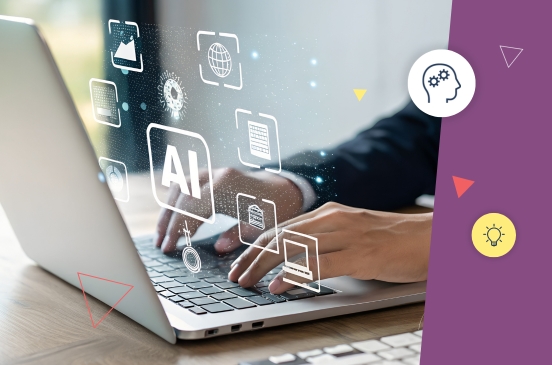Projected to reach a value of $11 billion by 2025, the global market for data migration is set to explode with the emergence of Generative AI. This is unsurprising as more enterprises move from legacy environments to cloud systems. It’s now a business necessity to leverage the power of Generative AI to harness their data potential.
While 2022 was the year when Generative AI came into public consciousness, 2024 is the year when Generative AI moves beyond the hype and tackles real-life business challenges. One such challenge is the complex state of data migration.
Here’s a deeper dive into the impact of Generative AI on data migration.
How generative AI improves data migration
80% of data migration projects do not meet their goals or overrun their costs and deadlines. With tools powered by Gen A, companies can mitigate common migration challenges by cleansing and validating the metadata. Further, AI-powered migration can maintain compliance with data privacy regulations like GDPR.
Here are some areas in data migration and modernization that Generative AI can impact:
- Data generation
An AI-powered tool with LLM integration, like Kingfisher can generate synthetic data, which can augment existing datasets – or even create new data for incomplete datasets. Additionally, synthetic data can be created using Generative AI algorithms, which can be trained to create larger and richer datasets (as compared to the original datasets).
This ensures the migrated data is complete without any missing data. - Data validation
Advanced AI technologies can enable data cleansing through automation by understanding data semantics and structures. This helps companies detect inconsistencies and errors in migrated data. Further, it can accelerate the migration process by automating the data validation process. - Semantic understanding
Data integrity is crucial to maintain during the migration process. With the Eagle migration planning tool, enterprises can accurately map the source and target of their data schema, thus ensuring data integrity.
By understanding data semantics like attributes and relationships, Generative AI enhanced solutions for data mapping can automatically map between the source and target of data schemas. These AI-powered tools can also use machine learning to recommend mapping suggestions from the user data. Additionally, it can prevent data losses by automating the mapping process. - Data security
In a recent data breach, a technology giant ended up compromising data of approximately 30 million customers. Synthetic data generators like Kingfisher can protect real-world data by generating its “artificial” version.
Advanced solutions with embedded AI can further safeguard data by generating synthetic data that preserves the properties of sensitive information. Sensitive data includes financial data or personally identifiable information (PII). Smart tools with Gen AI support also enables data regulatory compliance by generating synthetic “substitutes” for highly sensitive data.
Benefits of generative AI for data modernization
By accelerating the migration process, Generative AI can help enterprises reap the benefits of cloud migration quickly. Here are the main benefits of deploying context-aware tolls powered by generative AI during migration:
- Streamlining the migration process
Depending on the complexity of the existing legacy systems, migration can be cumbersome and involve a lot of manual tasks – such as data analysis, infrastructure modernization & provisioning, and compatibility testing.
AI-powered tools can automate these manual tasks, thus freeing up human resources to focus on other operational tasks. - Improved schema mapping
Generative AI-powered algorithms are trained to understand database schemas, data relationships, and structures. With this capability, these algorithms can build intelligent mappings for schemas.
Additionally, Gen AI tools can facilitate schema mapping through data pre-joining, where database tables are pre-joined in data warehouses and merged into a single structure. This is crucial in the process of modernizing databases. - Faster accurate code translation
Also known as refactoring, code translation is an integral part of data migration and modernization. For a smooth migration, the refactored code must be compatible with the target platform.
Smart tools with built-in Gen AI can understand the intricacies of the source code, thus enabling migration tools to translate it accurately to the target language. With code optimization, enterprises can also enhance code performance on the cloud platform. - Cost-effectiveness and ROI
Context-aware tools powered by Gen AI helps enterprises cut migration costs and improve ROI as they move to the cloud. According to McKinsey, these smart tools can deliver incremental ROI to cloud migration through the following 3-point benefits:
- Discovering new business use cases.
- Reducing the application remediation and migration costs and time.
- Improving the productivity of application development on the cloud.
All about the upcoming fireside chat on data modernization
In association with QKS Group, Onix has organized a fireside chat on the future of data migration. The chat is all about how Generative AI and autonomous data management can transform data migration.
Here’s the main agenda of the fireside chat:
- The use of Generative AI and autonomous data management in cloud migration.
- How Generative AI can enrich data quality – along with synthetic data generation and automated mapping.
- Leveraging no-code/ low-code solutions to simplify data migration.
- Learning about AI-powered automated testing and real-time observability.
Our data analytics solutions can help you improve decision-making by unlocking the true potential of data. Gain exclusive access to groundbreaking insights by filling out the form now.
Reference links:
https://www.hcltech.com/blogs/ai-and-data-migration-a-winning-combination-for-business
https://systechusa.com/decoding-the-allure-of-generative-ai-in-cloud-migration








